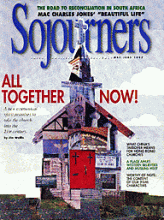Mac Charles Jones was my friend in the deepest meaning of that word. Jesus characterized this kind of relationship when he declared to the disciples, "I have called you my friend. Greater love has no one than this, that they lay down their lives for their friends."
Mac and I knew the meaning of what Jesus was saying in this definition of friendship. We did this daily for each otherwhether it was going places with one another when we really did not want to go, giving the other money that we did not have, or giving up on some part of our personality in order for the other to gain some ground. We knew how to give up life for the other.
That he was a large black man of immense racial integrity and that I am a smaller Southern white man who rejected the class privilege of the oppressor made this even more significant. The friendship showed us what is possible in a relationship and that we do not have to accept the defining criteria of the dominant racist culture. A black man and a white man can redefine relationship to include friendship.
My mother suspected this when in 1984 she sent me an article from The Columbus Inquirer, a regional newspaper that circulated around Eufaula, Alabama, and LaGrange, Georgia. The article was about Mac Jones, who was leaving LaGrange to pastor St. Stephen Baptist Church in Kansas City, Missouri. The article talked of Macs intense commitment to the struggle against racism and especially his work to expose and negate the activity of the Ku Klux Klan.
Read the Full Article
